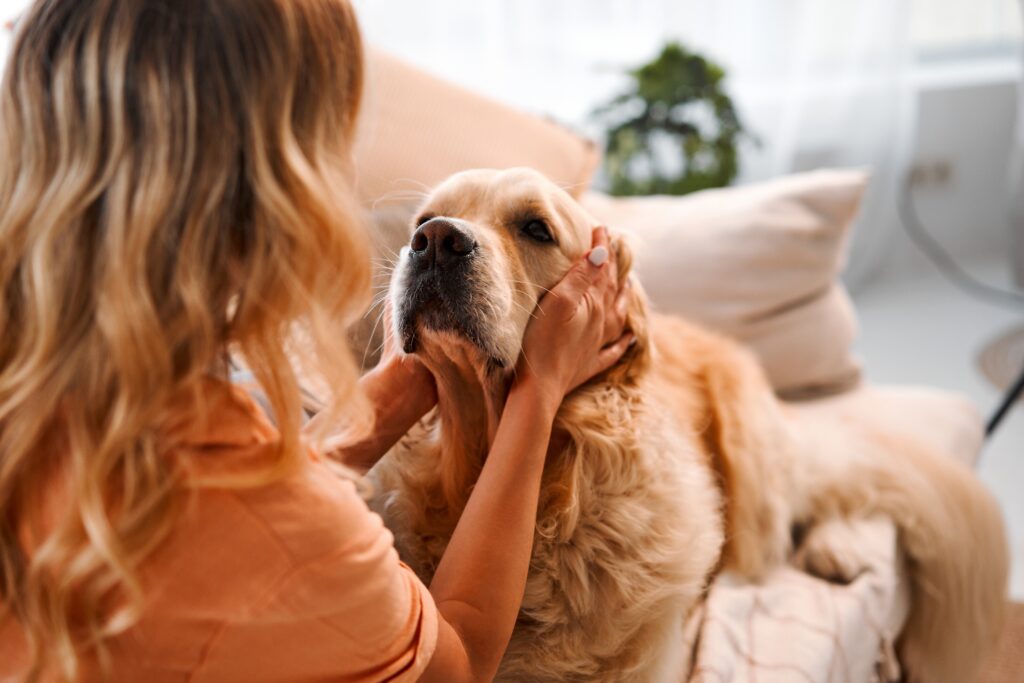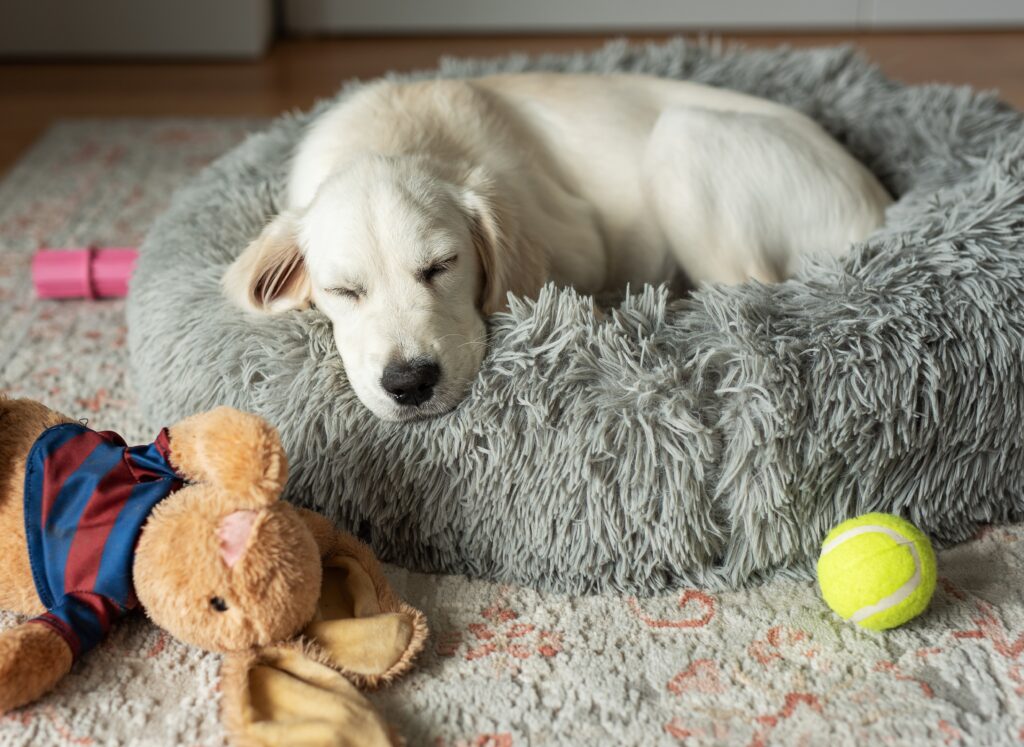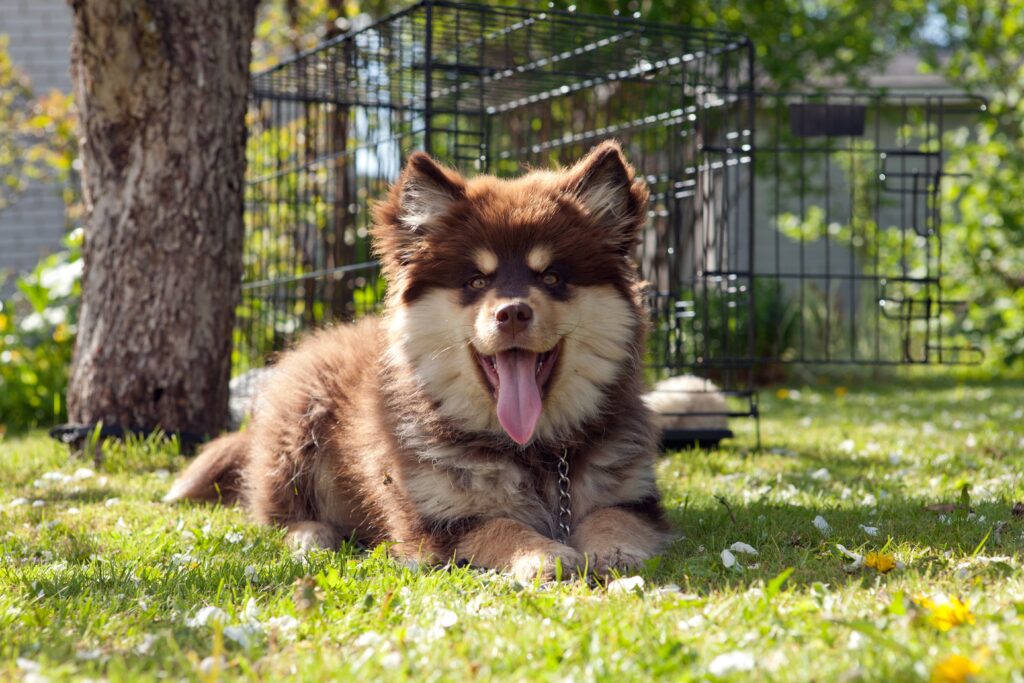Meeting a puppy, if you’re considering bringing one into your home, is an exciting experience. It’s crucial to observe the puppy carefully to assess their health, behavior, and temperament. This will help you determine if the puppy is a good fit for your lifestyle and if they’re in good physical and emotional condition.
Here’s what to look for when meeting a puppy…
Health and Physical Condition
Coat and Skin
- Shiny and Clean Coat – A healthy puppy should have a soft, shiny coat. Look for any signs of dryness, flakes, bald spots, or mats, which could indicate skin issues or poor health.
- Fur Texture – Depending on the breed, the coat texture will vary. It should be smooth and without excessive shedding. Patches of hair loss or overly greasy fur can indicate parasites or health issues.
- No Unpleasant Odors – Puppies should not have strong or foul odors, which could indicate infection or skin problems (like yeast infections or poor hygiene).
Eyes and Ears
- Bright, Clear Eyes – Look for clear, bright eyes free of discharge or redness. Cloudy eyes, excessive tearing, or discharge may be signs of infection or a health concern.
- Clean Ears – The ears should be clean and free from excessive wax, odor, or redness. Dirty or smelly ears can indicate ear infections or mites.
Nose
- Moist and Cool Nose – While a puppy’s nose may be warm or dry from time to time (especially after sleeping), it should be moist and cool. A persistently dry, cracked, or overly warm nose could be a sign of dehydration or illness.
Teeth and Gums
- Healthy Teeth and Gums – The puppy should have clean, white teeth and healthy pink gums. Discoloration or swelling could indicate dental issues or infection.
Mobility and Body Condition
- Normal Movement – Watch the puppy move around. They should be able to walk, run, and play without limping, stiffness, or signs of pain. Puppies can be clumsy, but they should not be excessively limping or appear lethargic.
- Healthy Weight – The puppy should have a well-proportioned body—not too thin or overly chubby. You should be able to feel their ribs easily but not see them prominently. Overweight or underweight puppies can have health issues or poor nutrition.
Temperament and Behavior
Socialization and Comfort Around People
- Friendly and Curious – A well-socialized puppy should be curious and comfortable being around people. Look for signs of a puppy that is willing to approach you, sniff you, and allow you to pet them without showing signs of fear (such as backing away, growling, or trying to escape).
- Comfort with Handling – Gently pick up the puppy or pet them to observe how they respond. A puppy that is comfortable being handled will not stiffen or show signs of aggression. However, be gentle and don’t overwhelm them. If the puppy is timid but not fearful, this could be an opportunity for socialization with time.
- Reaction to Other People or Animals – Watch how the puppy reacts to strangers or other animals. A well-adjusted puppy should be comfortable with different people and may even show excitement or curiosity around other dogs (provided they are socialized).
Playfulness and Energy Level
- Normal Play Behavior – Observe how the puppy interacts with their littermates (if applicable) or toys. A healthy puppy will engage in play—running, chasing, or playfully biting and wrestling. Overly aggressive or overly shy play can be a red flag.
- Balanced Energy – Look for signs of balanced energy. Puppies should be playful and curious, but not overly hyper or lethargic. Puppies that are consistently overly energetic may have difficulty calming down, while those that seem constantly sleepy or lethargic may be unwell.
Signs of Fear or Anxiety
- Shyness or Fear – It’s normal for a puppy to be a bit cautious in a new environment, but excessive shyness or fearfulness (such as trembling, hiding, or excessive barking) may indicate poor socialization or past trauma.
- Separation Anxiety – A puppy that shows distress when separated from their littermates or their caregiver might struggle with separation anxiety when brought into your home.
- Aggression – While some play biting and nipping are typical for puppies, any signs of aggressive behavior (such as growling, snapping, or biting with intent to harm) could indicate temperament issues that might need special attention or training.
Curiosity and Intelligence
- Responsive to Stimuli – Watch how the puppy reacts to new sounds or environments. Healthy puppies are usually curious about new things and will investigate new sights, sounds, or people.
- Intelligence – Puppies vary in intelligence, but they should be alert and responsive to their surroundings. Look for a puppy that is mentally engaged—one that observes their environment, plays, and interacts in a playful but not fearful manner.
Social Interaction with Littermates (if applicable)
Play with Siblings
- Healthy Play Behavior – Watch the puppy interact with their littermates (if you’re meeting the puppy in a setting where they are still with their siblings). Healthy puppies should be able to interact in a playful way with their littermates—chasing, wrestling, and having fun together.
- Social Dominance – Be mindful if a puppy seems overly dominant or overly submissive during play. While some assertiveness is natural, excessive dominance could lead to behavioral challenges later on, while overly submissive puppies may require extra encouragement and confidence-building.
Health History (Ask the Breeder or Shelter)
- Vaccinations and Health Checks – Ask the breeder or shelter about the puppy’s vaccination and health history. The puppy should have had their first set of vaccinations and deworming treatments before coming home with you. A health record will help ensure that the puppy has been properly cared for.
- Vet Visits – If the puppy is coming from a breeder, ask if they’ve had a vet checkup. This will help you confirm that the puppy has no obvious health concerns. It’s also a good idea to ask about the puppy’s parents to get an idea of potential inherited health issues.
Bonding Potential
- Connection with You – Although it’s too early to expect a deep bond with a puppy at just a few weeks old, observe whether the puppy seems to enjoy being near you, following you with their eyes or showing interest when you talk to them.
- Comfort Level – Does the puppy seem comfortable being with you or in your presence, or do they appear fearful and stressed? A puppy that’s stressed may need extra time to warm up to their new family.
General Red Flags
- Excessive Barking or Whining – While some vocalization is normal, constant crying or barking can indicate stress, discomfort, or other issues such as poor socialization.
- Lack of Appetite or Disinterest in Food – A puppy that refuses to eat or doesn’t seem interested in food may be ill, stressed, or not feeling well.
- Flatulence or Diarrhea – Persistent gastrointestinal issues, such as diarrhea or excessive bloating, can indicate parasites or a health problem that should be addressed by a vet.
- Coughing, Sneezing, or Wheezing – Persistent coughing, sneezing, or wheezing can indicate respiratory issues, which may require veterinary attention.
When meeting a puppy, it’s crucial to observe their health, behavior, and temperament. Look for a puppy with clear eyes, healthy skin and fur, a comfortable and curious demeanor, and an appropriate energy level. Avoid puppies that seem overly fearful, aggressive, or lethargic. Ask about the puppy’s health history and vaccinations, and ensure that the puppy has been properly socialized and cared for.
The goal is to find a puppy that is healthy, happy, and a good match for your home and lifestyle. The early stages of a puppy’s life are crucial for their development, so make sure you’re prepared to offer the love, attention, and training they need to grow into a well-adjusted adult dog.


